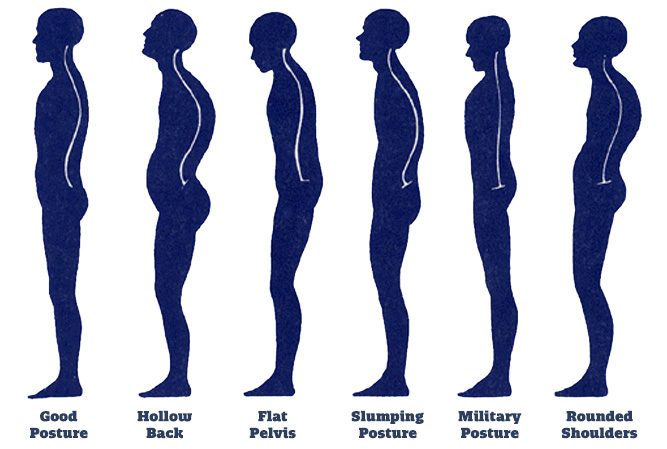
Poor posture has been linked to physical issues, such as neck and back pains, along with mental and psychological issues. Poor posture, most commonly identified as “slouching,” limits a person’s ability to perform tasks adequately opposed to when our spine is straightened. Even though many of us have fallen victim to this “comfortable” position at the office or in class, there is a chance we can eventually suffer from our lack of good posture. It is hard to break bad habits so it is recommended to visit a physical therapist to help improve and prevent further complications.
How do you know if you have poor posture? The most visible signs of poor posture are shoulders that slouch, an arched lower back, a curved spine, and a head or neck that jab forward. Specialists believe poor posture deals with constant unfriendly spine positions. For example, our tendency to slouch is a direct cause of sitting at a desk for too long and may be a problem related to postural kyphosis or rounded shoulders.
Postural kyphosis occurs when chest muscles tighten and cause excessive curving of the spine. As a result, postural muscles in the upper back tend to weaken and loosen. To prevent kyphosis, being aware of how you are sitting or standing is key. A physical therapist can help teach exercise routines to strengthen back muscles.
A few tips to help prevent poor posture:
- Keep your feet shoulder-width apart and to make sure the distribution of your weight is evenly balanced.
- Remember to have your chin leveled (parallel to the floor) and look straight ahead.
- Relax your shoulders
- Keep your knees slightly bent while standing
- Let your arms rest naturally
- Avoid sleeping on your stomach
Rounded shoulders can pose another posture related problems. About 73% of the population complain they have a problem with their posture. The natural curve of the neck is more pronounced when slouched and straightening your back while sitting can benefit not only posture but respiratory intake. Rounded shoulders compress your diaphragm and can lead to shallow breathing. Adjusting posture allows proper breathing and helps to maximize oxygen intake, helping to relax the muscles and prevent stress from building up in the areas of the neck and back.
Lake Country Physical Therapy & Sportscare PC offers the very best physical therapy in Ontario County. We treat all your wants and needs with our trusted and experienced Physical Therapists and staff. To begin to feel pain and stress free, start your Physical Therapy journey today and schedule your evaluation by calling (585) 396-1400.
No comments:
Post a Comment